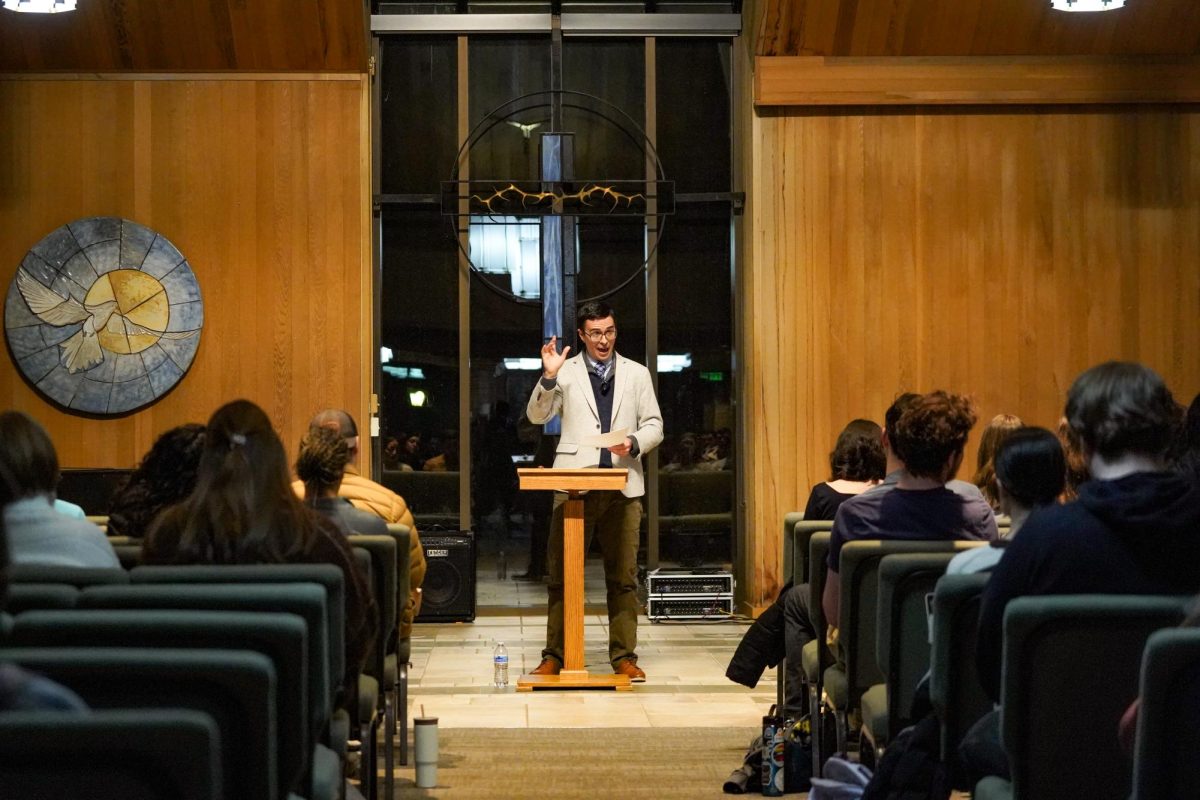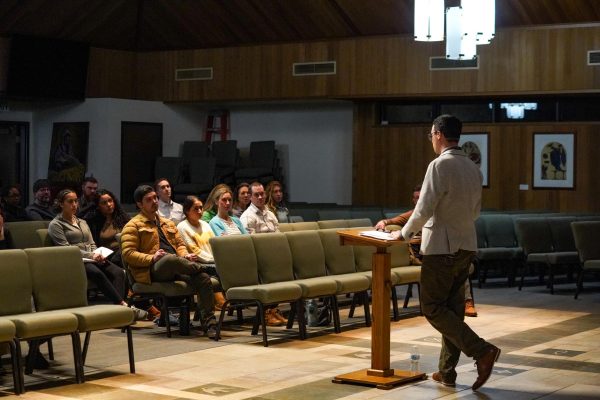
Kaiden Devereaux
Dr. Brad East speaks on foundations of faith for the spiritually hungry at the Whitworth University Chapel, Wednesday, February 19, 2025, in Spokane, Wash. | The Whitworthian/Kaiden Devereaux
On February 19, Dr. Brad East gave a lecture in the Chapel, “Scripture to Scrolling: How to become a Christian in the digital world,” and talked about the harm that digital technology has caused within both the nation and the church, calling it the “greatest challenge facing American Christians today.”
Dr. East is an Associate Professor of theology at Abilene Christian University and wanted to help push students to pursue Christ and serve the world amid the current climate, but noticed that the church and society are “not at their healthiest.” He pointed out that about one in five American adults reports daily loneliness and added that marriages and births have been on a decline.
As far as the state of the church goes, East described the current state as “The great de-churching,” noting how roughly 40 million fewer Americans have attended church over the last 25 years. He believes the overall identity and sense of communion within the church body has weakened, and what once was a place of community and worship became a “religious marketplace” where entertainment and individuality mattered most. East also noted a drop in “Bible literacy,” saying that more Christians today haven’t even read the Bible on their own.
East described the impact of digital technology in one word: “Screentopia.” He said that when someone gets absorbed by their screen, they end up being “nowhere.” Screens, according to East, disembody us from our body and soul, “dis-embeds” us from our friends, families and communities – lifting us out from these things. Digital technology disentangles us, ruins face-to-face communication and disintegrates our attention span. Because it takes patience and attention to both read the Bible and pray, East said Christians need to see these challenges and act with “agency.”
The question, then, is how do we start to fix this? First, East said that churches should stop making the digital problems worse by removing means of distractions through encouraging people to put their devices away and rethink their practices of live streaming. And individually, East said Christians should read and pray daily, as it is “essential to our discipleship with Christ.”

For those who want to limit their screen use but don’t know where to start, East recommended two books: “The Tech-Wise Family” by Andy Crouch and “Digital Minimalism” by Cal Newport. In Newport’s book, he recommended readers do what he calls a “digital declutter,” where one cuts out unnecessary and harmful apps entirely for 30 days. After the 30 days pass, spend another 30 days evaluating if the app is something you believe to be necessary or beneficial. “I know that’s one practice many of my students found helpful,” Dr. East said. He also recommended that people do this with others and physically journal their experiences while doing so. This is all in the name of making sure that “these devices are not in charge of us, but [that] we are in charge of them.”
Lastly, Dr. East said the church needs a renewed connection to Catechesis. “Catechesis is the ancient Christian word for instructing new believers in the faith,” Dr. East explained. East felt that the modern church today has made Catechesis “shallow” or “superficial,” and added that the church should truly be teaching Christians “into an entire way of life.” For East, this includes acts of service, justice, generosity, ethics, politics, worship and prayer – not just saying “just love and believe in Jesus.” “Because that’s a way of life, it actually takes time for somebody to learn how to do that,” he said.
Whitworth students Elena Vigil and Tommy Chase were motivated by East’s lecture. Vigil said it was an interesting and eye-opening lecture that reflected her relationship with digital technology. “I feel very convicted. I should be able to stick to my guns and do these challenging things that aren’t immediately giving me dopamine, [but] in the long run are so much better for me,” she said. Having tried to delete Instagram in the past, she hopes she can take action by taking Dr. East’s suggestions with others. “I think community is a really important thing,” Vigil said.
Having spent a month in the Cascades for a Bible ecology course, Chase managed to cut his daily phone use from five hours a day to about half an hour per day after “dumbing down” his phone. He said he was “affirmed” by the lecture, but still called it a “blunt confrontation” and hopes that others will consider Dr. East’s call to action. “I hope that Brad East’s words would invoke some sort of thought and maybe lead people to just hesitate a little bit more when reaching for their phone,” Chase said.
Dr. East acknowledged that giving up short-term satisfaction with social media and screens will require a real sacrifice and won’t be easy. However, he said there is long-term pleasure and satisfaction to be had through following Christ.
You can get more information about Dr. Brad East at his website: https://www.bradeast.org/